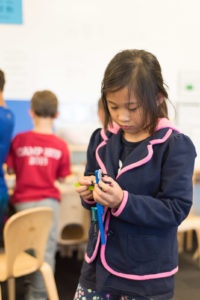![]()
Educational expert Sheri Glucoft Wong, LCSW, recently visited INTL* to discuss ways we can help our children build healthy relationships with themselves, parents, siblings, and friends. How can we help kids thrive through positive communication, and a positive self-image?
-
Home is a child’s training ground for how the world works.
If children are respected and heard at home, they will work to be respected and heard in the world. If children are catered to at home, and everything centers on them, they will expect the world to center on them as well. We support our kids best when family life reflects what they can expect in their world outside of home.
-
Run your family with mutual respect and regard.
This creates a positive feedback loop – if children are expected to respect others, they will respect themselves. Encouraging positive relating between siblings, rather than bickering and belittling, will support mutual respect at home, which will extend into your children's other relationships as well.
-
Have confidence in your kids and they will have confidence in themselves.

Trusting that your kids can take on age-appropriate responsibilities and chores demonstrates your confidence in them, and helps them develop confidence in their own abilities.
-
Use clear language, not long explanations.
Say, “No, you can't have that chocolate bar,” rather than saying, “You can’t have that chocolate bar because refined sugar is bad for your teeth and it isn’t gluten free, etc.” Kids respond best to simple communication, and this helps avoid long negotiations with your child. If they need more information, share that at another time, not in the moment when you are setting a limit.
-
Distinguish “Oh well!” mistakes from mistakes that matter.
Help kids learn not to be upset by every small misstep. When a child does make a mistake, help them make it right instead of punishing them. For example, if a child spills cereal, have them clean it up, instead of getting angry at the spill.
-
Ensure 5 positive relationship-building comments to every 1 task master comment.

For every time you ask your child to set the table, do their homework, or clean up, be sure there are five times when you sincerely engage with them about their interests and activities. It is important to not fall into a role where nagging is your primary communication with your children.
-
A little bit of short-term disappointment is good for brain development.
The “disappointment muscle” needs to be exercised from a young age if we want out kids to develop resilience. It can be beneficial to get out of our kids’ way and let them be disappointed. Those experiences help them learn to adapt when things don’t go their way.
Studies show that the capacity to relate to others is a much greater predictor of long-term success than academics – one reason why social-emotional development is so crucial. More importantly, however, it also gives our children a sense of well-being and connection to their family, friends, and the world around them.
*In 2020, the International School of the Peninsula (ISTP) formally changed its name to Silicon Valley International School (INTL) to better reflect its bilingual programs, location, and international values.
![]()




